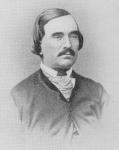A much acclaimed Australian-based tenor, trombonist, composer, orchestrator and librettist, John Howson was born into a musical family. His siblings included Frank (b 1817; d 1869), an actor, director and stage manager who Eric Irvin describes as the 'cleverest of the brothers' (Dictionary of Australian Theatre p136), and younger sister Emma (b 1844, d 1928). All three were regarded as especially fine singers and established high profile reputations in Australia during their careers. Although John and Frank each displayed a precocious talent for vocal and instrumental music, Frank initially sought a military career. John in the meantime concentrated on establishing his credentials in the world of music and theatre. His early career saw him appear at several prominent London theatres including the Theatre Royal, Drury Lane. After Frank returned from the Carlist wars in Spain ca.1840, the pair determined to immigrate to Australia. In 1842 they accepted an engagement to tour Australia for singer and entrepreneur Anna Clarke. The following year they appeared in an extended season of concerts and opera in Hobart before moving to Sydney where they presented an extensive repertoire of drama and music theatre at the Royal Victoria (1845-1855) and the Prince of Wales Theatre (from 1855). Their productions ranged from Shakespeare's Macbeth, The Merry Wives of Windsor and Hamlet to more contemporary works like The Hunchback, The Lady of Lyons and Money. The numerous operas staged by the brothers included: The Barber of Seville, Fra Diavolo, The Bohemian Girl, Lucia di Lammermoor, Maritana, The Marriage of Figero and La Sonnambula. The brothers also appeared in the world premiere of Isaac Nathan's (q.v.) Don John of Austria (1847), which is itself historically significant, being the first opera to have been written and staged in Australia. John Howson took the role of Phillip II, with his brother cast as the protagonist, Don John.
1848 saw the debut of John Howson's own opera, The Corsair. The libretto is based on the same Byron poem that Verdi had founded his Il Corsaro on. Another notable production from around this period was the Australian premiere of Maritana (1849), for which John both arranged the music and played the role of Don Caesar. In 1853 Frank adapted the text for a musical farce, Rogers Worried (from the Mark Lemon and B. M. Webster farce Keeley's Worried), which was staged at the Royal Victoria Theatre. From 1856 he and John toured the Australian colonies as members of a company managed by Andrew and Louise Torning. Both were engaged as actors, with Frank taking on the additional position of stage manager and John as music director. With the arrival of W. S. Lyster (q.v.) in 1861, the Howsons, as did many other companies staging music theatre, found their productions suddenly outclassed. As a consequence Frank Howson left Australia for America in 1866, touring there with his own English and Italian Opera Troupe. The company included four of his children. Frank died in the USA in 1869 from cancer. Similarly, John Howson found the Lyster company impossible to compete with and around the same time that Frank left Australia he also travelled to America, where he appeared as a principal with a number of companies specialising in opera and operetta. He died early in 1888.
In his Dictionary of Australian Theatre Eric Irvin draws attention to the passion, determination and ingenuity displayed by early music theatre pioneers such as the Howsons who, he writes : 'had to cope with every imaginable difficulty - a shortage of sheet music; difficulty in getting and training a chorus; tenors having to sing baritone roles, sopranos singing tenor roles, and inadequate orchestras. More often than not operas had to be given in shortened versions, so as to fit in with the long programmes demanded at the time. But there were also times when [the brothers were] able to produce an opera as written, worth all the necessary soloists, a chorus, and adequate orchestra, and appropriate costumes and settings' (138).


